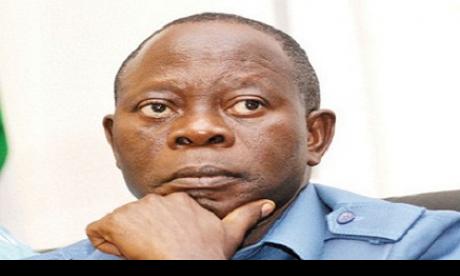By UDEME NANA
Sunny Okosun’s song of despair, “Which Way Nigeria?”, bemoans the regression seen in the country since after independence until 1986, the year I first listened to the song. Were he still alive, the musical icon would have seen a need to replace the locale of his song, Nigeria, with his state of origin.
Listed as Nigeria’s 22nd state, Edo was created on August 27, 1991. It is peopled by five tribes — the Bini, Afemai, Esan, Owan and Akoko Edo — dispersed across 18 local government areas.
That state has produced great men and women in almost every sphere of human endeavour and is home to such pioneers as the late Pa Michael Imoudu, the father of labour unionism in Nigeria, and Solomon Arase, top cop and former inspector-general of police. Edo is the homestead of the legendary Enahoro brothers: Anthony, who moved the motion for Nigeria’s independence in 1953, and Peter, popularly known by his penname “Peter Pan”, one of the greatest journalists to have plied that profession. The likes of the late Dele Giwa, Tony Momoh, Raymond Dokpesi and John Momoh of whom some contemporaries including Eric Osagie, Frank Aigbogun and several others are worthy successors.
Still in the field of music, Edo gave Nigeria Majek Fashek, Sir Victor Uwaifo and several others.
Among very prominent Christian religious leaders from that state are Cardinal Olubunmi Okogie, the late Archbishop Benson Idahosa, Rev. Chris Oyakhilome and Apostle Johnson Suleiman of Omega Fire Ministry in Auchi.
In the business sector, the Esama of Benin, Chief Gabriel Igbinedion of the Okada fame, leads the pack. Edo has also produced two former military vice presidents — admirals Augustus Aikhomu and Mike Akhigbe. Incidentally, at least two Edo sons served as governor: Samuel Ogbemudia and Godwin Abbe, the second military governor of Akwa Ibom State.
In the legal profession, Chief Mike Ozekhome, SAN, stands tall; there are also the Bello Osagies, the Ehanires, and the Asemotas.
In the academia and other professions, Edo State has a sample that is representative of the best anywhere in Nigeria who could compete elsewhere in the world.
That state, in its heyday, could have provided all the players for the Super Eagles, as it was an assembly line for great footballers like Stephen Keshi, Bright Omokaro, Sunday Egboigbe, Aghagowa, Agbonlahor, Yakubu Ayegbeni, Wilfred Agbonibvare, Odion Ighalo etc.
Its ugly side has names like Lawrence Anini, Monday Osunbor and their ilk — notorious underworld kingpins. This is in addition to the state’s alleged notoriety as the “prostitution headquarters” in Nigeria! Yet, these cannot blight the rich profile of Edo and its varied positive contributions to the development of Nigeria.
One of the beautiful things about Edo is the Bini traditional institution which has served to maintain the rich traditional culture of the people, particularly the Binis. Other shining lights in the resume of Edo are its ivory masks, bronze heads, coral beads and white attire which give their people a unique personality anywhere.
The story about Edo State on the front burner of national discourse this time, however, is not any breakthrough in education, science, technology, a new art form or music from any of its numerous tertiary institutions. The news is not about a discovery of how the magical traditional stool of the Oba has survived and succeeded in maintaining the tradition and culture of the Binis for centuries. Yes, the story this time is not about how Chief David Edebiri, the Esogban of Bini Kingdom, has been able to effectively administer and regulate the activities of witches and wizards in the ancient kingdom, being its traditional head. It is not about the well-being of the average Edo indigene or how the state has grappled with the covid-19 pandemic or plans in the aftermath of the pandemic.
Rather, the running story is about the political disagreement between two erstwhile political allies, Adams Oshiomhole and Godwin Obaseki. The odyssey of Mr Oshiomhole — a former textile worker-turned-labour-unionist who rose to become the national president of the Nigeria Labour Congress, who fought his way to emerge as a two-term governor of the state, and then national chairman of a ruling party in the country — is the quintessential “from grass to grace profile”, a story that could inspire others. But his brash, brook-no-dissent attitude which led to his suspension by his Etsako Ward 10 of his party has not wrapped him in glory. The avoidable losses suffered by his party on his watch as the national chairman has not helped his profile as a great leader and consensus builder. Having led Edo State for a maximum two terms as provided by the constitution, should he not have allowed his protégé some space to carry on as governor?
Politics is designed to build societies, protect lives and property and provide an enabling environment for citizens to achieve their aspirations in life, besides expanding the frontiers for development and progress; but, regrettably, in Nigeria today, as exemplified by the rumblings in Edo State, politics seems to tear down people and society.
Edo, once a place of pride, is now enmeshed in a theatre of the absurd.
Whenever the curtain falls on this raging political crisis, Nigerians, especially the younger generation, must take away some critical lessons, one of which is to take very seriously their education and documentation through the entire process. No student should leave gaps in any aspect. Ensure that names are correctly spelled and consistently so at every stop. Ensure that the t’s are crossed and the i’s properly dotted. These are very little things that can shame and torpedo lifelong aspirations.
It is also critical to pay attention to formation of character in the Nigerian society because any society which recruits leaders with poorly seasoned backgrounds lays a foundation for needless crisis.
Dr Nana, a senior lecturer, writes from Uyo.











